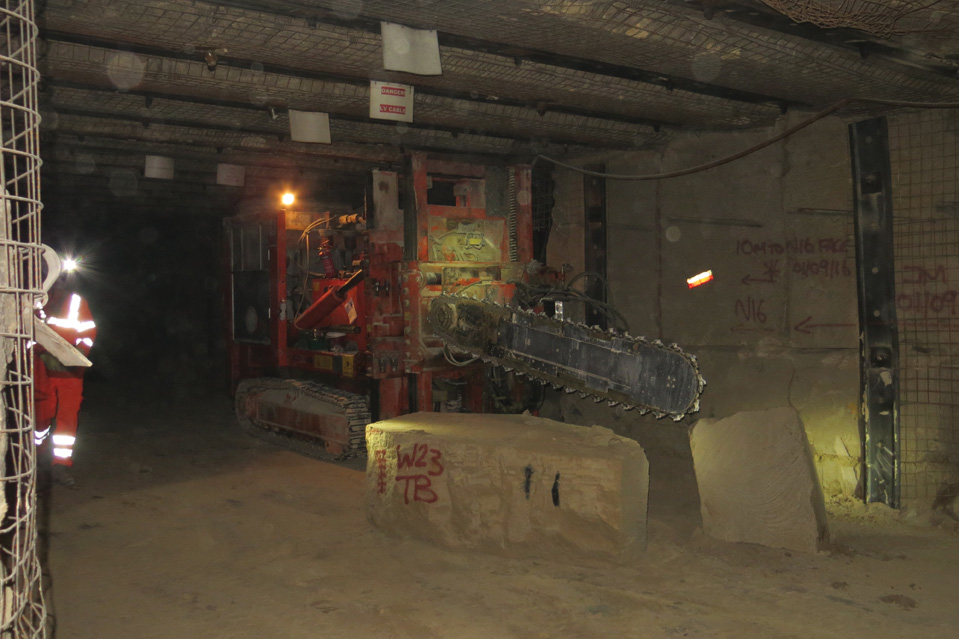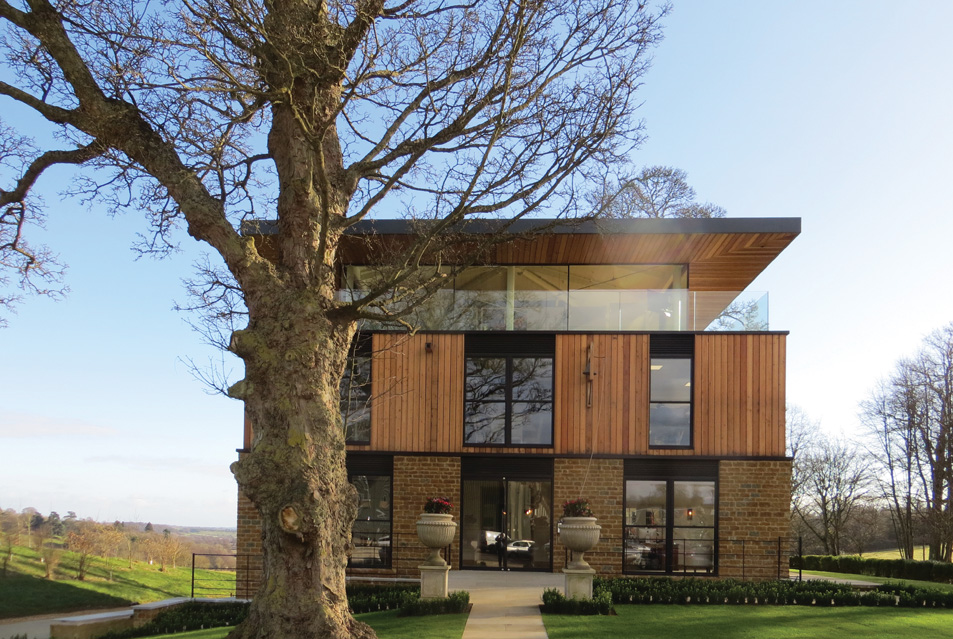Johnston Quarry Group has become a major supplier of Bath Stone following its purchase of The Bath Stone Group and Hanson Bath & Portland last year. Added to its existing reserves of other limestones and ironstone, the purchase puts the Group in the first division of indigenous stone producers in the UK. Owner Nicholas Johnston spoke to Natural Stone Specialist magazine about his plans.
Interesting times. That’s how Nicholas Johnston, owner of the Johnston Quarry Group that bought The Bath Stone Group and Bath & Portland last year, sums up the UK at the moment.
His comment encompasses a lot: politics, housing, Brexit... and the development of a number of larger groups like his own in the indigenous stone sector.
 “The natural stone industry is changing and evolving and gradually getting a few bigger players rising to the top,” says Nicholas, whose group is one of them, selling 50,000 to 60,000 tonnes of block a year.
“The natural stone industry is changing and evolving and gradually getting a few bigger players rising to the top,” says Nicholas, whose group is one of them, selling 50,000 to 60,000 tonnes of block a year.
Larger groups tend to be more conscious of health & safety and invest more in production and processing. “It makes us more trusted and able to appeal to bigger and more substantial clients.”
The Bath Stone reserves taken over by Johnston Quarry Group include those parts of Hartham Park Bath Stone underground quarry developed by Bath & Portland under its own land before the lease to other parts of the quarry, including the entrance, were taken over by Lovell Stone in 2016. The Bath & Portland rights include the premium Box Ground beds.
Before Bath & Portland left Hartham Park it walled up its underground workings to separate them from those included in the Lovell lease and planned to open a new adit to the mine (underground quarries and mines are the same thing but traditionally Bath Stone miners like to refer to their workings as quarries).
Nicholas Johnston: “I think we are at a good natural capacity in terms of what I and my team can properly administer. The acquisitions [of the Bath Stone mines] last year needs a bit of time to bed in. We have a good mix of businesses and we are very happy with the assets we have. I have a busy family life and professional life, both of which I love and just about manage to co-ordinate. I have loved my journey in life and in the stone industry, every aspect of which I enjoy. I enjoy the product; the visual beauty of the buildings we help to create.”
Johnston Quarry Group intends to go ahead with the plan to open a new, drive-in entrance to Hartham Park, although in a slightly different location to that planned by Bath & Portland. It will now be on a newly acquired piece of land nearer to an ‘A’ road for easier transportation. The new portal should be opened next year.
In the meantime, it had been planned to continue to extract Bath Stone from Monks Park, which Bath & Portland re-opened after losing the lease to the entrance of Hartham Park. But now Nicholas Johnston has determined that the stones the market wants are Stoke Ground Bath Stone from Limpley Stoke and the stone from Hartham Park. So Monks Park has been mothballed and the Fantini saw from there has been moved to Limpley Stoke to increase production of Stoke Ground.

In September last year, Nicholas Johnston and his head office team moved into these new, purpose built headquarters at Great Tew. This is not just for the running of the quarrying business, but also of Nicholas Johnston’s two estates – the 4,000acre Great Tew in Oxfordshire and the 1,000acre Bantham in Devon. Nicholas says they are both busy farming estates.
Another of the Bath & Portland assets was the masonry works at Keynsham, Bristol, which has now been closed. Nicholas Johnston plans to build new masonry works on the site of the new opening to Hartham Park. And he says the closure of Monks Park and the Keynsham works will free money to accelerate the work at Hartham Park.
Although Johnston Quarry Group has provided some level of overall branding, its individual quarries have so far operated largely as separate entities. Now, though, the plan is to tighten up the branding, uniting the individual parts by design elements and type fonts. The new branding will be seen soon on new websites and in new brochures.
 Bath Stone will continue to operate as The Bath Stone Group, managed by Matthew Hawker, who has been Mine Manager at Limpley Stoke for many years. The logo of Bath Stone Group now incorporates the hammer symbol previously used by Bath & Portland (pictured).
Bath Stone will continue to operate as The Bath Stone Group, managed by Matthew Hawker, who has been Mine Manager at Limpley Stoke for many years. The logo of Bath Stone Group now incorporates the hammer symbol previously used by Bath & Portland (pictured).
Last year’s acquisitions mean the Johnston Quarry Group now has six block stone opencast quarries and three Bath Stone mines, albeit that one of them has been mothballed.
The overall processing capacity is being further increased by a £1million investment at Great Tew, in Oxfordshire, which is one of two estates owned by Nicholas Johnston.
Great Tew is the source of Great Tew Ironstone, which gave Nicholas his introduction to the natural stone market.
“I think there’s space for there to be a distinct Bath entity and a distinct quarrying entity,” he says. “Elaine [Marson] and Hanson had between them made a Bath stone identity strong in its own right.”
Elaine Marson was the previous owner of Bath Stone Group and Hanson owned Bath & Portland.
Nicholas: “I’m excited by the opportunities – the scope and scale of the Bath Stone market. And I’m seeing that same encouraging dynamic in both ironstone and limestone. All aspects of the business at the moment seem strong.
“Another dynamic that’s particularly important for the market is that there seems to be a much more sensible pricing structure that allows all layers in the supply chain – from the block to the stonemason, the fixer and the client – to be making money... and that’s not always been the case in the natural stone market.”
Johnston Quarry Group is optimistic that demand for stone will remain strong, spurred on by a housing market in England that all major political groups agree should be aiming for 300,000 units a year, although that would be an increase of more than 30% on current levels of building.
People buying houses have high expectations of the quality of their purchases, especially in that affluent part of the country where Johnston Quarry Group operates and to where it is content to restrict its influence.
Nicholas: “This limestone belt in the Cotswolds, Lincolnshire and now Bath is our geographical interest. I think I have to be aware of my own logistical and time limitations – there’s only so much a young, entrepreneurial company can do.”
There is no doubt that properties with stone walls in mixed developments are always among the first to sell and the ecological arguments of low levels of encapsulated carbon in indigenous stone are well rehearsed, “so let’s get more stone into our homes”, says Nicholas.
“It’s been proven over centuries, if not millennia, that stone is the preferred product for construction. This country needs to have a supply and long-term delivery system for natural stone in its natural, regional location.”
Many county council and district council planners understand the importance of regional materials to the significance of place and few, if any, construction materials can make quite the contribution to that significance that stone does – for new build and for repair and maintenance, alterations and extensions. “That brings us back to the Bath Stone market. That story is exactly the sort of scenario that I bought into.”
Of course, there’s that element of uncertainty introduced by Brexit. Nicholas says the future is unclear and although wider macroeconomic issues are out of his control, he tends towards optimism and believes the stone industry, which is so dependent on the overall level of construction activity, will benefit.
“It will only be good for housebuilding, construction, restoration. I think there’s still huge scope for more British stone to get out there in the market. If Brexit means there’s less of a platform for foreign materials maybe that will be good for domestic stone businesses.
“Things are changing,” he says. A generational shift is taking place in the stone industry. Money is being invested and substantial businesses are being created. His own group has developed sales of £10million a year in round figures with £3million profit. “I wouldn’t have had any idea the business would have grown like that when I started.”
And for the future? “We continue to evolve.” Whether that will involve more acquisitions remains to be seen. None is planned but if the right opportunities appear they are not ruled out.
In the meantime, this year Johnston Quarry Group plans to re-open a former Aggregate Industry quarry, Ropsley, in Lincolnshire, and Flick Quarry in the Cotswolds.
“If they can get housebuilding up to 300,000 a year they’re going to need this product,” says Nicholas. “You don’t get a 30% increase in housing unless all sectors of the supply chain have the capacity to increase by 30% as well. The great thing about quarries and mines is that you can increase and decrease flow more easily than if you’re a brick manufacturer.”
Although the Johnston Quarry Group has grown and continues to do so, the stone industry has always benefitted from personal relationships on a local level and the Group wants to retain the relationships which have been built up. They allow it to be nimble and responsive in a way larger, more corporate entities find difficult to achieve.
The Group employs nearly 70 people and Nicholas Johnston emphasises the importance of the people who work with him. “I have a cracking team of key individuals who are all shareholders,” he says. “We all pull together to develop the business sensibly. I don’t think any of us would have thought it would have developed to quite the platform it has.
“What’s helped us is that we have remained open and co-operative in how we work. We supply block to virtually anyone – providing they pay their bills on time! We just want to do business with nice people. I hope over the years people have found us fair and equitable to do business with.”
In an industry that sometimes seems to have been content to hide behind the mystery of its dark arts, the Johnston Quarry Group has tried to be open and transparent. In what Nicholas describes as “this Google world in which we live” light is being shone into the darker corners of the stone industry, allowing big customers to understand and scrutinise the supply chain.
The Johnston Quarry Group ethos of collaboration and co-operation with clients encompasses customers in the stone industry. “We don’t want to threaten our friends. We have tried to facilitate the growth of the market in general. We consider the rest of the stone industry our partners. They trust where we are in the market and we leave the cream on the cake for them.”

